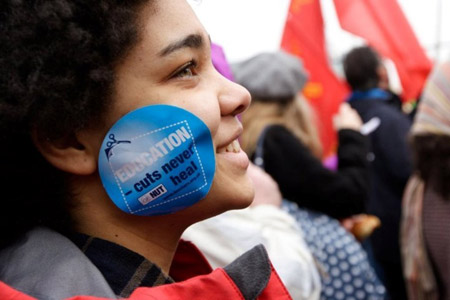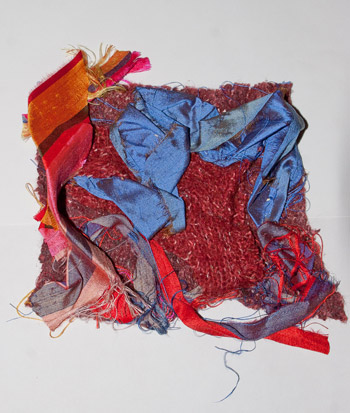
| HOME |
| NERVE |
| REVIEWS |
| ARCHIVE |
| EVENTS |
| LINKS |
| ABOUT US |
| CONTRIBUTORS |
| BACK ISSUES |
| CONTACT US |
Back to index of Nerve 19 - Winter 2011
Recently back from the Occupy London Stock Exchange camp outside St. Paul's, art student and activist Takiyah spoke to Nerve about her art, the London camp, the student protests and how she views these as part of a process to raise awareness of the need for global change.
The Art of Activism
Takiyah had planned to go back to London the afternoon we met, but had decided to stay in Liverpool to help organise the student protests set for 9 November.
 On
Art
On
Art
I'm most inspired by the Impressionists, their use of colour, how they observe their surroundings and how they use brush strokes. For example, Pissarro and his use of light. I don't have a particular style. I've moved away from what I originally thought in the way of painting. My photography is the same. I don't have a specific area. More and more I've been leaving my camera at home because I feel restricted in protests by it.
The Protests
St Paul's is a mish-mash of different opinions. You have some people who are anti-corporation, whatever that means, and then you have people who are anti-capitalist. And you also have differences within those two groups.
I joined the protest at St Paul's because I think there needs to be a change of system. So if there are any kind of protests that are moving towards that, or have the potential to move towards that, then I go to them to gain experience, and also to learn new things.
I don't think it's a revolutionary movement, but it has the potential to move towards this. It's not hard hitting enough and it doesn't cover all the angles that need to be covered. There isn't enough direct action or outreach.
There are no real plans within this protest, and I kind of like that. I think that kind of thing will come in time. I've met a lot of people who have said they were not really radical until this happened. A lot of people are learning as they go along. And because of all the differences in opinion you couldn't all agree straight away on one set of plans. It's good not to rush things. They are generally going in the right direction.
They don't actually discuss as much as they should. For instance, there was some attempt to discuss the topic advertised as 'Are you an anti-capitalist?', but you have people there who won't even use the word 'capitalism' so this didn't materialise, only with a few people, when this sort of thing needs to be discussed by everyone who is there.
 |
| This image is one of the things I did for my textiles brief. I based this final piece on the effects of the elements on the derelict houses at the back of my house. |
There are two sides to what's going on in the world; the economic and the political. We only seem to be attacking the political, and only just about doing that. There is no real economic side to the protest. We're not doing any damage to any bank or investments or anything along those lines. I suppose that will happen when people become more conscious of what capitalism actually is and the extent of the system.
Most people are just focused on this country, and they don't connect to struggles in other countries, or that the conditions in Western countries are pretty much got off the backs of workers in poorer countries. All we hear about is how banks here and in the US are being bailed out, but not about how banks are direct funders of the arms industry and how these arms are being used against people in poorer countries. We still have a long way to go in our thinking about what the system actually is. Once all these connections are made people will start to think differently about what is needed to be done.
We need to do stuff that will make people think, not just for the moment, but thought that will stick. All these people in different countries need to connect with each other and see that we are all part of the same struggle. We are just at different stages. We don't have enough people involved at the moment to make a change happen. An example of this was the blocking of Westminster Bridge (see the Nerve website: 'Block the Bridge - Save the NHS') where 3,000 people gathered against the bill that is going through to destroy the NHS when there are millions going to be affected by the changes. As long as we are willing to take the brunt of the crises then capitalism will carry on.